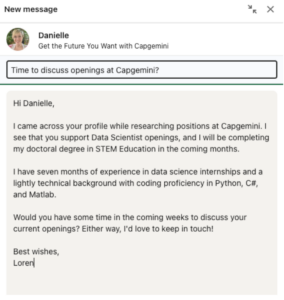For international students, one of the most intimidating ideas besides “job seeking” might be “networking.” This is especially true for those from places where networking is not common. Initially, it may go against your instincts to engage in networking. However, it’s undeniable that networking plays a crucial role in both professional and academic settings in the United States. Once you conquer and become proficient at it, you become unstoppable.
Why Networking Matters
Networking is about building professional connections to help you navigate your career path. Networking includes finding job opportunities, obtaining career advice, discovering new ideas or accessing valuable resources from experts in your fields of interest.
Networking with Recruiters
According to CNBC, 70 percent of jobs are not published publicly on job sites, and 80 percent are filled through personal and professional connections. Therefore, cultivating good relationships with industry recruiters can help you tap into the hidden job market and stay informed about internal opportunities.
Consider a day in the life of recruiters: For each position, they face the incredibly tough task of selecting one person from hundreds of thousands of applicants. Opting for someone they know and have interacted with previously is an easier decision than choosing someone they’ve never met or only encountered briefly in an interview. Even if things don’t work out immediately, maintaining a continuing relationship with recruiters is a great idea.
Networking with Professionals
Beyond job hunting, networking offers a valuable avenue for accessing mentorship opportunities. By actively engaging in networking, you can connect with experts within your niche or area of interest. These connections can be established through various means, such as attending events or initiating contact through direct messages.
Once a connection is established, you gain access to a wealth of resources, enabling you to seek guidance, ask questions and receive valuable feedback directly from experienced experts. It’s also an effective way to improve your skills and self-development.
Networking with Faculty and Classmates
Your connections within your classes and programs are also extremely valuable. Since faculty members are already experts in their fields, and some of your classmates have experience in the marketplace, they may have connections to potential employers or industry professionals who can assist you in advancing your career or lead you to mentorship opportunities. Additionally, your classmates and faculty can form a strong support system throughout your job search journey.
The Networking Mindset
It is important to approach networking with the right mindset. Here are three helpful tips on how to think about it.
- Remember: It’s about meaningful connections: Networking is not simply a shortcut to finding a job. While it can certainly aid in job-search endeavors, networking is primarily about establishing mutually beneficial, long-term relationships. Approach networking with an authentic mindset and a sincere curiosity about others and their passions, rather than solely focusing on what you can gain from them. People can discern your intentions, so remember that being genuine establishes trust and fosters significant connections which are truly invaluable.
- Don’t take it too seriously: While networking holds undeniable value, it’s important not to take it too seriously. Understand that not every interaction will lead to immediate results, so it’s OK to view networking as a learning experience rather than a high-stakes, make-or-break endeavor. To be frank, the worst outcome you might encounter is being ‘left on read’ or even rejected. This is perfectly common and should not be taken personally. Often, you’ll be pleasantly surprised to find that people are much friendlier and receptive than you might expect. So relax, stay prepared and go for it.
- Embrace openness: Although you may have a particular topic or goal in mind, remain open-minded to different perspectives and unexpected opportunities. Embrace this by connecting with individuals from various backgrounds, industries and viewpoints. You never know when their insights or information may prove invaluable in the future. Stay open to the possibilities that networking presents, as they could lead to unforeseen opportunities and enriching experiences.
How and Where to Network
There are multiple ways to find people you would like to connect with. Feel free to choose those that best suit your circumstances and personality.
LinkedIn stands out as the largest professional networking platform globally. If you haven’t already, I highly recommend creating an account. Here are a few tips on how to search for people and who you can connect with.
- Connect with alumni. Many agree it’s the best way to practice networking since an emotional bond already exists among the alumni community. The University of Texas at Austin has an especially vibrant and supportive network of alumni.
- Go to the UT Austin LinkedIn page and click on the “Alumni” section
- Search for titles, companies or locations you are interested in
- After entering all relevant keywords, scroll through the page to find the “People You May Know” section
- Reach out to recruiters who work at your desired companies or those hiring for positions in which you’re interested. This can significantly enhance your visibility among other applicants. Sending a polite and concise message can make a positive impression on recruiters, and if they find your profile intriguing, they’ll likely be pleased to reach out to you.
Here is an example of a personalized message that you could send to a recruiter:
Reference: Loren Cressler, Working with Recruiters Workshop
Hookedln
Did you know that UT Austin has an official and exclusive UT Austin social networking platform? HookedIn is designed to connect students, alumni, employers and friends of UT Austin to career opportunities and mentorship. It’s also an optimal avenue for reaching out to alumni with a reduced likelihood of being left on read.
Hornslink
You can also utilize Hornslink to discover student organizations and communities with similar interests, values or backgrounds.
Interstride
International students can utilize the “Network” page in Interstride to find current students or alumni with the same nationality and majors.
Handshake
You can explore events hosted by employers or on-campus workshops on Handshake to expand your network.
Appointment with Texas Career Engagement
Get practical and insightful advice from a pro. Texas Career Engagement offers free, high-quality appointments to all UT Austin students.
Go For It
Remember: Even if you feel intimidated, uncomfortable or afraid, every bit of discomfort you experience while networking is worth it. You’re not just building connections; you’re constructing a network that will serve as a foundation for your career development, help you achieve your goals and ultimately enhance your quality of life, expertise and experience.
Embrace the challenges and uncertainties that come with networking — they’re stepping stones toward your future success. Keep pushing yourself outside your comfort zone because in doing so, you’re opening doors to endless opportunities and growth.
For more information, contact Sadiya Ahmad, Ph.D, program manager for advanced degree career identity and global impact at Texas Career Engagement.
Blog Contributor: Pin-Yi (Judy) Chu, graduate global impact consultant



Leave a Reply